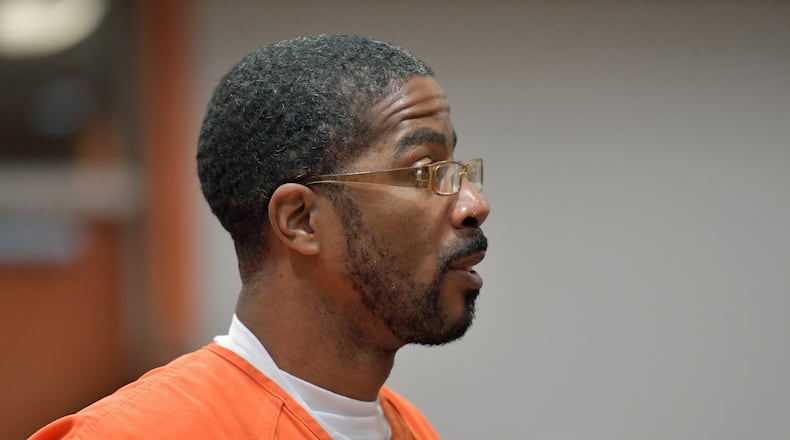When 45-year-old Christopher Williams walked into the courtroom Thursday, he was still shackled and wearing a worn orange jumpsuit, but he was smiling. He turned to the gallery and looked at his mother, who beamed and raised both of her hands in praise, only slightly above her head, as if to contain her joy until the hearing was done and everything was settled.
Williams was at the DeKalb County Courthouse so a judge could free him from prison by effectively tossing out his sentence of life without parole. He was sentenced in 2000 for his part in a liquor store robbery in which no one was injured and he had been the unarmed lookout.
The accomplice who'd actually wielded the gun got only 10 years, but, because Williams had a previous armed robbery conviction as a teenager, Georgia's mandatory minimum laws forced the first judge to sentence him to the harshest punishment possible in this state, apart from death.
This week, DeKalb County District Attorney Sherry Boston agreed to Williams’ release, largely because the law that led to his sentence was changed by the Georgia Legislature in 2013, allowing judges discretion to choose whether life without parole is appropriate. The DA’s move was extremely rare. She said it showed her office’s commitment to criminal justice reform and correcting the errors of the “tough on crime” 1990s, which contributed to mass incarceration.
Williams' release also comes at a time when lawmakers across the country, Republican and Democrat, are growing more open to sentencing reforms. Gov. Nathan Deal made criminal justice initiatives a centerpiece of his two terms in office and this week the sentencing reform bill known as the First Step Act was shepherded through Congress by President Donald Trump.
“We believe in victim advocacy first and foremost. We also believe in fair and just sentencing,” Boston said, urging other prosecutors to consider a second look at such cases. “Georgia is one of just three states in the nation that imposes mandatory life without parole for a second armed robbery.”
When Williams went into prison, he was 25 and had a baby son. He came from a tight family, who’d all loved to find a reason to throw a barbecue. They stayed close when he left home in Decatur for Hancock State Prison in Sparta. His mother, Cathy White, and other family would visit as often as they could, though it was hardest for Williams’ son.
Aaron Littman, one of Williams’ attorneys, said Williams has matured greatly behind bars, becoming a barber, then a librarian. He also became a person who talks often about wanting to find a way to help young people make better decisions than he did.
For 19 years, White prayed with Williams and told him to believe he’d one day go free. His grandmother told him he’d be free, too. They just didn’t know how.
One day earlier this year, White, a retired DeKalb Medical Center worker, was watching TV and saw something about the Southern Center for Human Rights. She excitedly scribbled down the number and called her first chance. The group quickly agreed to take up the case.
The center is a nonprofit that provides legal representation to people in the criminal justice system in the South. In the coming weeks, the nonprofit approached the DA’s office with a list of 14 people, including Williams, who were serving life without parole in DeKalb cases because of the old law. Of the 14, Williams was the only one who wasn’t armed when committing his crime.
READ: A lifelong offender takes a ride on the Georgia parole roller coaster
READ: Convicted killer admits killing 90, including at least 7 in Georgia
READ: How a mysterious disappearance nearly destroyed a woman's life
Boston agreed Williams’ sentence wasn’t right and that, because of his exemplary record in prison, he’d clearly reformed enough to be released.
But when the DA’s office contacted the victim of the robbery Williams was involved in, he objected to the plan. The victim, who the DA’s office said didn’t want to speak to media, didn’t care that Williams had only cased the store for the armed co-defendant; he still thought Williams should die in prison.
Boston stood firm. “We disagreed,” Boston said. “But I know looking at all the facts and circumstances this (is) fair and just.”
Thursday’s court decision led to joy in Williams’ family, though the timing was bittersweet. It’s good because he’ll be home for Christmas, bad because Williams’ grandmother just died and was buried this past Saturday, never getting to see him walk free.
Superior Court Judge Asha Jackson agreed to the deal worked out by the lawyers and the DA, under which Williams is to be released and serve about nine months of probation. The DA said the nine months was needed to round out 20 years, which is about what sentence he would get if he were sentenced in 2018.
Williams rose to address the court.
“I pray and I hope I won’t disappoint y’all,” Williams, who was soft spoken, said. “(I want to help) anybody I can — whether it’s one or 100 — to change lives, to keep young brothers and sisters from being put in positions like I was when I was younger. Thank y’all and God bless y’all.”
In the gallery, tears washed the faces of Williams’ brother, niece and nephew. His mother raised her hands again and broke down after he walked out with deputies, who were taking him to the county jail for the formal release process. It would be several hours before he walked free, but the family had waited 19 years already; a little while longer was no bother.
Williams’ mother felt her faith affirmed.
“There is a God,” she said, looking up in a crowded courthouse elevator.
“Yes,” someone spoke up, “there is.”
About the Author
The Latest
Featured







